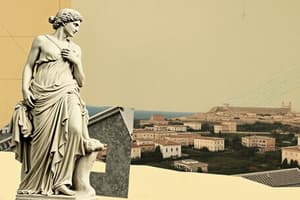Podcast
Questions and Answers
According to the saying, how many ears and eyes do we have?
According to the saying, how many ears and eyes do we have?
Each of us has his own difficult ______.
Each of us has his own difficult ______.
battle
Match the following parts of human anatomy to their suggested function in the saying:
Match the following parts of human anatomy to their suggested function in the saying:
Ears = Listen more Eyes = See more Tongue = Speak less
What does the phrase 'everything in excess is against nature' imply?
What does the phrase 'everything in excess is against nature' imply?
Signup and view all the answers
Before healing someone, it is necessary to ask about their willingness to change their habits.
Before healing someone, it is necessary to ask about their willingness to change their habits.
Signup and view all the answers
What should be considered before healing someone?
What should be considered before healing someone?
Signup and view all the answers
Before you heal someone, ask them if they are willing to give up the things that make them ______.
Before you heal someone, ask them if they are willing to give up the things that make them ______.
Signup and view all the answers
Match the following concepts with their implications:
Match the following concepts with their implications:
Signup and view all the answers
Who is known as the father of geometry?
Who is known as the father of geometry?
Signup and view all the answers
Euclid recommended that one should only offer help and not refrain from causing harm.
Euclid recommended that one should only offer help and not refrain from causing harm.
Signup and view all the answers
What are the two actions that Euclid suggests one should make a habit of doing?
What are the two actions that Euclid suggests one should make a habit of doing?
Signup and view all the answers
Euclid is referred to as the father of __________.
Euclid is referred to as the father of __________.
Signup and view all the answers
Match the following individuals with their contributions:
Match the following individuals with their contributions:
Signup and view all the answers
Study Notes
Ancient Greek Era (Hellenic Period)
- The era, spanning 1200-323 BC, saw significant contributions from thinkers, writers, warriors, artists, architects, and philosophers.
- Human settlement in Greece dates back approximately 40,000 years, with early life centered around hunting and agriculture.
- The Minoan civilization, named after King Minos, marked the beginning of Greek civilization, centered on Crete.
- Hellas was the original name for the region, before being called Greece by the Arabs.
- The Greek people spread their culture across various countries, particularly Italy and France.
- They drew inspiration from prior civilizations like the Pharaonic and Phoenician civilizations.
Greek Philosophers
- Pythagoras: Famous mathematician, known for sayings like "Anger begins with stupidity and ends with regret," and "Friends are like traveling companions."
- Hippocrates: Known as the father of medicine; his saying: "We eat to live, not to live to eat," and "Before you heal someone, ask them if they are willing to give up the things that make them sick."
- Euclid: Considered the father of geometry, and famously stated, "The laws of nature are but the mathematical thought of God."
- Archimedes: A prominent mathematician, known for the quote: "A person always learns from his past; we cannot study history the other way around." "Rise above yourself and understand the world. ","He knows how to talk who knows when to be silent".
- Homer: Poet and writer who wrote about the creation of humanity in his famous quote, "Of all the creatures that breathe and move on earth, none is born weaker than human."
- Plato: Philosopher, whose famous quotes include "Love is blind," "Give and you will receive", "The greatest victory a man can win is victory over himself," and "The important thing is not to live, but to live well."
- Aristotle: Philosopher, known for the quotes "Who is no longer your friend was never your friend", "Happiness comes from within ourselves, not from others," and "The worst of people is who, through his immorality, harms both himself and others."
- Socrates: Philosopher, renowned for the quotes "Who is not satisfied with what he has will never be satisfied with what he wishes to have","He gave us two ears, two eyes, and one tongue, which indicates that we must listen and see more than we speak.", "Be kind to everyone you meet; each of us has his own difficult battle.", and "Life is not a search for the self, but a journey to create the self."
Greek Architecture (Hellenic Period)
- Greek architecture is highly developed.
- The Greeks focused on proportion; Greek buildings were based on dimensions, volume, and relationships.
- They mastered stone and marble for construction, creating monumental structures.
- Columns are a key architectural feature of the period.
- Three types of columns are distinguished: Doric, Ionic, and Corinthian.
Greek Temples
- Temples were the most important and widespread buildings within Greek architecture.
- They served as places of worship, storage, and votive offerings.
- They were oriented towards astronomical points.
- Temple dimensions could reach up to approximately 115 meters by 55 meters.
- Columns reached heights of up to 20 meters.
- Temples were made of mud brick on stone foundations—later columns were made from stone and marble.
- The altar was often in the open.
Greek Furniture
- The Klismos chair was a distinctive piece of Greek furniture.
- Evidence on Greek furniture is found in artwork, such as pottery, reliefs, and sculptures.
- Wood was the primary material for furniture construction.
- Wealthier homes had furniture adorned with metal.
- Furniture typically emphasized simplicity and elegance, with an interest in smooth lines and comfort.
- Furniture was not a major focus point in the average home; less furniture was typical.
Modern Furniture Inspired by the Greek Era
- Modern furniture design draws inspiration from ancient Greek forms.
Studying That Suits You
Use AI to generate personalized quizzes and flashcards to suit your learning preferences.
Related Documents
Description
Explore the fascinating developments during the Hellenic Period, which saw remarkable contributions in philosophy, art, and culture from ancient Greece. Learn about significant figures like Pythagoras and Hippocrates, and understand how their ideas shaped the Western world.




